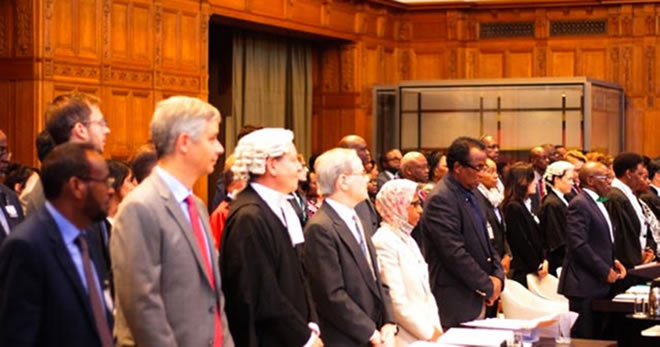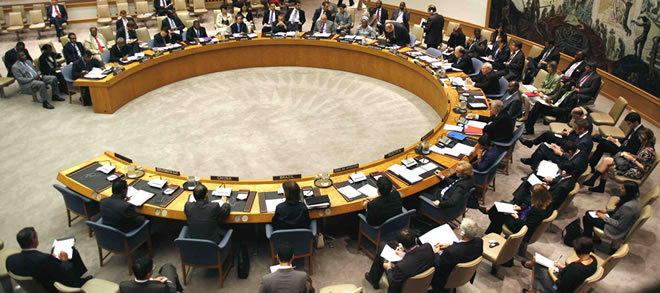
Kenya’s Undisputed Intent to Steal Somali Seas
0 0 Google +0 0
Nonetheless, the MOU was merely based on the international conventions, which allows countries sharing disputed maritime boundaries to create Joint Development Zones (JDZ) rather than a solid agreement that the border would run east along the line of latitude. The two countries also agreed that they should continue to work together to find a solution so that the matter would not have to go to court, until the Kenyan government became facetious and uncooperative. Under the circumstances, the Somali federal government became frustrated over Kenya’s dishonesty over its maritime borders and by parliamentary vote disowned the 2009 MOU between the two countries, dismissing it as an attempt by Kenya to merely protract the process, which was already deadlocked and eventually filed an Application with the ICJ against the Republic of Kenya. Somalia is basing its arguments on Articles 15, 74 and 83 of the 1982 United Nations Convention on the Law of the Sea (UNCLOS), which both countries ratified in 1989.
Heikal I. Kenneded
heikalk@yahoo.com
Washington D.C.
by Heikal I. Kenneded
Friday, October 14, 2016
Friday, October 14, 2016
Now that the preliminary hearings of maritime delimitation in the Indian Ocean (Somalia v. Kenya) at the International Court of Justice (ICJ) in The Hague were wrapped up, it is clearly evident the Kenyan government’s malicious intent to blindly steal the vast Somali seas. The Kenyan government cognizant of its meritless dispute with Somalia over its maritime border, requested from the ICJ to basically adjudicate the case brought by Somalia against Kenya because it is irrelevant and not within the jurisdiction of the Court, and therefore should accordingly be dismissed. But Somalia has utterly exhausted in resolving its maritime dispute with Kenya amicably through diplomatic channels and it has completely lost faith with its counterpart that it decided to take its case to the highest Court in the land. Kenya’s duplicity is deliberately illustrated on its argument that the ICJ lacked jurisdiction to determine the case and feebly relying on concocted Memorandum of Understanding (MOU) that has no bearing with maritime boundary delimitation, instead of arguing the primary substance of its case
The current Somali government led by Hassan Sheikh Mahmoud should be highly commended for spending so much political and economic capital to hire prominent international lawyers and other technical maritime experts in order to defend Somalia’s case at the Court. Unlike its predecessor administration whose ministers nonchalantly signed the Memorandum of Understanding (MOU) currently in contention that Kenya gave such leverage to base its entire argument that the Court should not hear Somalia’s case over the dispute of maritime borders. This case goes back to the year of 2009, when Kenya and Somalia allegedly reached a deal signed as a Memorandum of Understanding (MOU), which granted each country “no-objection” in regards of being compliant on the outer limits of the continental shelf outside of 200 nautical miles. This was then deposited to the UN Commission on the Limits of the Continental Shelf (UNCLOS) in 2011.
Conversely, during the recent Court hearings, Kenya very well aware of its losing case has raised certain preliminary objections to the jurisdiction of the Court and to the admissibility of the Application, accusing Somalia of filing an “inaccurate” report to the court, alleging that there were ongoing negotiations between the two nations and the surprise court application was nothing short of backstabbing. Moreover, Kenya’s blatant disregard for conventional maritime delimitation boundaries with Somalia makes a series of concern for all Somalis who interpreted it as a malicious tactic of how much Kenya is trying to take advantage of their country’s moment of weakness and turmoil.
What’s more, during the recent Court hearings, Kenya has repeatedly referenced how unstable Somalia is and the security threat that terrorist group like Al-Shabab poses to the Horn of Africa. In fact, the Kenyan Attorney General, Githu Muigai’s bone of contention over the maritime disputes between his country and Somalia was based on the threat his country constantly faces a clear and present danger posed by Al Shabab in regards of security threat related to weapons smuggling and infiltration by sea, instead of the . Further, he concluded of his portentous picture of depicting Somalia, as a lawless country that there was no maritime enforcement capacity whatsoever, and therefore it should not have any additional legitimacy over this disputed maritime boundaries in the Indian Ocean. This clearly shows how far Kenya will go in stealing the Somali Seas.
The other unfathomable issue that baffles most Somalis is Kenya’s cheeky accusations of Somalia as “disrespectful” and ungrateful country because Kenya has “sacrificed” so much for Somalia since the collapse of the Somali nation-state in providing humanitarian aid to refugees resettled in their country and how the Kenyan military forces played major role in defeating Al Shabab terrorists. On this twisted premise, Kenya made its case before the recent ICJ court hearings that the maritime boundary dispute between the two countries should only be solved once Somalia achieves stability. This is another wicked sign of Kenya trying to trade favors done in the past for illegitimate territorial gain, which is nothing short of highway robbery.
The other major contentious issue is Kenya’s flagrant concessions of these disputed waters to other foreign companies to expl0re oil and gas, which is another clear sign of its resolve to disregard any legal means of ownership before exploiting it for riches, while paradoxically claiming ongoing negotiations with Somalia. These potentially lucrative vast waters are estimated to be 100,000 square kilometers of offshore territory and they are believed to contain large oil and natural gas deposits. Nonetheless, it is illegal for Kenya to award oil and natural gas exploration rights to multinational foreign oil companies, such as Eni and Total because the concessions lie in in disputed waters owned by Somalia, which completely undermines the sovereignty of Somalia.
Given the Court’s historical adjudications, it should be noted that Kenya is miserably following another failed precedent case in which Nigeria filed eight "preliminary objections" challenging the Court's jurisdiction and the admissibility of Cameroon's Application, back in 1995. However, the ICJ by 14 votes to 3 rejected Nigeria's objection that the Court has no jurisdiction to rule Cameroon's Application. According to the Court, Cameroon did not violate the principle of good faith by not informing Nigeria of its intention and decision to bring a case against Nigeria.
Indeed, the Court is expected to follow suit and rule that Somalia is eligible to proceed with its case to challenge Kenya overtaking its maritime borders. Because the International Court of Justice (ICJ) in The Hague is the primary judicial organ of the United Nations, which is the only court of a “universal character” with general jurisdiction that resolves, in accordance with international law, legal disputes deferred to it by different countries. Thus, its judgments have binding power and are without appeal for all the parties concerned. In other words, the maritime borders between Somali and Kenyan should be fair and square, because Somalia wants the ICJ to delineate the maritime boundary and to govern the precise geographical coordinates as latitude of its southeastern land borders. Conversely, Kenya would like to see its maritime boundary to go in a straight line parallel to the line of latitude on its eastern border. This apparently gives Kenya the larger share of the maritime area in dispute.
Finally, Somalia is in a much better position than Kenya with respect to international maritime laws and once a final decision is reached as early as of next year and if the court should decide in favor of Somalia, the Kenyan border is expected dramatically shift southward. This could further lead to a dispute over the maritime boundary with Kenya's southern neighbor Tanzania, which could in turn have a cascading effect on other African countries, including Mozambique, Madagascar and South Africa. Since both Somalia and Kenya have ratified the UN Convention on the Law of the Sea (UNCLOS), they will have to abide the outcome because the tribunal’s ruling will be an authoritative statement of just how egregiously Kenya is violating international law in the Indian Ocean. In the meantime, if nothing else happens, the case that was heard over last month threatens illegal exploration rights that Kenya has superciliously granted to oil and gas companies already working in the disputed maritime borders.
Heikal I. Kenneded
heikalk@yahoo.com
Washington D.C.




